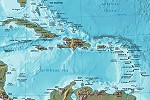By Stephen Kangal
September 03, 2008
 Several reasons can be advanced to support the incremental view that Manning’s latest political incarnation totally lacks any semblance of credibility. Readers will recall that in 2004 Manning floated a similar plan to achieve political union with St. Vincent and Grenada by 2007. That plan never saw the light of day.
Several reasons can be advanced to support the incremental view that Manning’s latest political incarnation totally lacks any semblance of credibility. Readers will recall that in 2004 Manning floated a similar plan to achieve political union with St. Vincent and Grenada by 2007. That plan never saw the light of day.
Continue reading Manning’s Political Integration Lacks Credibility

 Last night Barack Obama made history when he became the first African-American to be nominated to lead the Democratic Party for the presidency of the United States of America. On November 4, he will create history yet again by becoming the first black President of the United States.
Last night Barack Obama made history when he became the first African-American to be nominated to lead the Democratic Party for the presidency of the United States of America. On November 4, he will create history yet again by becoming the first black President of the United States. I have just seen the box office hit movie, Hancock, with my two teenage sons and their 12 year old cousin. As usual, after seeing a movie with the kids, we engaged in debates about the representations and subtle messages in the movie. I asked the young men if they liked the film and they all agreed that it was a great film. I asked them what they liked about it and they said that Will Smith was the greatest superhero ever. Then they asked me if I liked the movie and I said no that I did not. Why not? They all asked in unison.
I have just seen the box office hit movie, Hancock, with my two teenage sons and their 12 year old cousin. As usual, after seeing a movie with the kids, we engaged in debates about the representations and subtle messages in the movie. I asked the young men if they liked the film and they all agreed that it was a great film. I asked them what they liked about it and they said that Will Smith was the greatest superhero ever. Then they asked me if I liked the movie and I said no that I did not. Why not? They all asked in unison. PRIME MINISTER Patrick Manning yesterday defended his moves to form a regional political union calling it “a coalition of the willing” and saying the current mechanisms of Caricom “are too slow” to achieve the urgent goal of regional integration.
PRIME MINISTER Patrick Manning yesterday defended his moves to form a regional political union calling it “a coalition of the willing” and saying the current mechanisms of Caricom “are too slow” to achieve the urgent goal of regional integration. T&T has a tradition in being tardy in establishing maritime boundaries with its neighbours until it was unilaterally hauled before a compulsory UN Arbitral Tribunal by Barbados, spent millions of pounds in the costly litigation and an unfair and punitive boundary was imposed on us. It took us seventeen years to conclude the 1990 Treaty with Venezuela and we have been in discussions on the subject with Barbados since 1989.
T&T has a tradition in being tardy in establishing maritime boundaries with its neighbours until it was unilaterally hauled before a compulsory UN Arbitral Tribunal by Barbados, spent millions of pounds in the costly litigation and an unfair and punitive boundary was imposed on us. It took us seventeen years to conclude the 1990 Treaty with Venezuela and we have been in discussions on the subject with Barbados since 1989. The Economic Partnership Agreement (EPA) which is heavily slanted in favour of its drafters, the European Union (EU), and which the EU insists that the Caribbean agree to and sign by September 2, should be rejected and a completely new EPA drafted, which, genuinely, takes into account the social and economic interests of Caribbean nations.
The Economic Partnership Agreement (EPA) which is heavily slanted in favour of its drafters, the European Union (EU), and which the EU insists that the Caribbean agree to and sign by September 2, should be rejected and a completely new EPA drafted, which, genuinely, takes into account the social and economic interests of Caribbean nations. THE Beijing Olympics are coming to a close as I write on Friday morning. Having just savoured the world-record-breaking run of Team Jamaica (4 x 100M in 37.10 seconds) and seen the Trinidad and Tobago quartet win silver, I ask myself: what more can any ardent sports fan ask for? Oh, I felt for the Jamaican women’s relay team as the bane of baton-passing struck them out of sure-gold. I didn’t feel as hurt for the USA’s men’s and women’s teams that suffered a similar fate yesterday. I write that off to the braggadocio that has become the trademark of the Americans-until now.
THE Beijing Olympics are coming to a close as I write on Friday morning. Having just savoured the world-record-breaking run of Team Jamaica (4 x 100M in 37.10 seconds) and seen the Trinidad and Tobago quartet win silver, I ask myself: what more can any ardent sports fan ask for? Oh, I felt for the Jamaican women’s relay team as the bane of baton-passing struck them out of sure-gold. I didn’t feel as hurt for the USA’s men’s and women’s teams that suffered a similar fate yesterday. I write that off to the braggadocio that has become the trademark of the Americans-until now. Dharti Mata’s rich productive plains of Central Trinidad have suffered from yet another devastating blow to its hard earned agri- based patrimony. This follows upon the ill-advised and politically motivated cruel closure of the sugar industry of Caroni Ltd just when enviro-friendly sugar-cane -based ethanol emerged as the lucrative renewable fuel of the future.
Dharti Mata’s rich productive plains of Central Trinidad have suffered from yet another devastating blow to its hard earned agri- based patrimony. This follows upon the ill-advised and politically motivated cruel closure of the sugar industry of Caroni Ltd just when enviro-friendly sugar-cane -based ethanol emerged as the lucrative renewable fuel of the future.